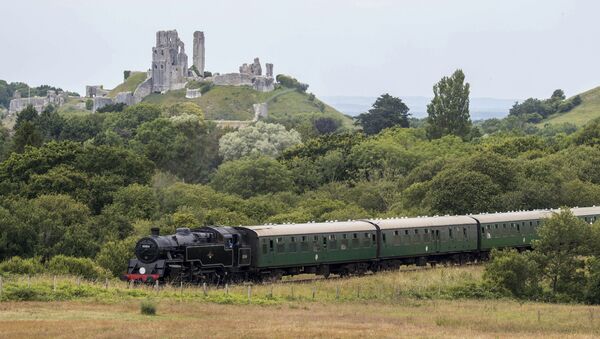Sputnik spoke on the issue with Ellen Lees, campaign officer for the We Own It Group.
Sputnik: What does this most recent poll tell us about the public's view on railways? What challenges would a government face trying to nationalise Britain railways?
Ellen Lees: This poll shows that nationalising the railways is as popular as it always has been and it's not surprising given the amount of delay and cancellation and chaos on our railways over the last couple of years in particular. I think it's important to note that it's popular even with Conservative voters so slightly under half of them support the idea of renationalizing the railways which is interesting given that it's a typically a sort of left-wing policy but if you've stood on a train platform recently watching the delayed or cancellation notices pile up then you'll understand where this frustration is coming from and why it's so popular.
In my opinion franchising, the current system, has obviously failed and pretty much everyone agrees with that including the private train companies but the question is what to replace it with? So at We Own It - we've been saying for years that we should bring the railway into public ownership and that would save us money, it would mean that we could keep ticket prices reasonable and simple and it would mean that we could create a joined-up railway that actually works for people.
In order to get people out of cars and into public transport to meet our climate objectives; we've got to start thinking about how to join up our public transport networks and it's a lot easier to do that when they're not all owned and controlled by different private companies who are often operating in competition with one another.
Sputnik: This most recent poll tells us something we’ve known for a long time and that’s firstly Britain’s railways are not up to scratch and secondly passengers want the existing rail network changed. How do these sentiments match with proposed policy pledges from Britain’s parties? Are any of Britain parties committed to fixing the UK’s railways?
Ellen Lees: I think it's going to be difficult for the Conservatives to convince their voters that slight changes or little incremental rejigging of the system is really going to fix the problems especially when you know that everyone is so agreed that the current system is totally not fit for purpose. Labour's proposals are to bring franchises into public hands as they expire at no cost and eventually to create one unified rail network and I think that matches the public's opinion and of course the Greens have that as their policy as well.
Sputnik: What challenges would a government want to nationalise Britain’s railways face in the future after December this year?
Ellen Lees: I think the figures that the Conservatives and others have been pushing on the cost of nationalising very services have been massively overinflated and on the railways in particular, if we bring the franchise into public hands one at a time as these contracts expire or as they fail as the East Coast did that won't cost us a penny.
So that's completely free. Further down the line, there might be proposals to start manufacturing rolling stock or and trains or buying the rolling stock rather than paying huge amounts of money to rolling stock leasing companies whose only job is to lend these train's to the franchises. So they're essentially a middleman that gets I think 200 million a year, which is essentially just wasted money.
There will potentially be some investment involved in constructing or buying the train but that will save us money in the long term and we would save 1 billion pounds a year by ending the inefficient fragmentation of the railway by using a lower cost of borrowing when things are in public hands and by not sending dividend payments to private company shareholders.



